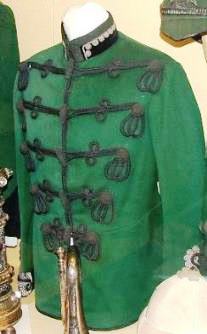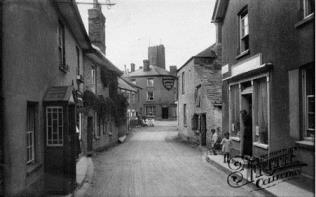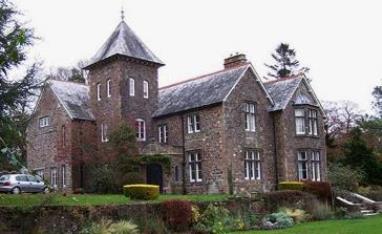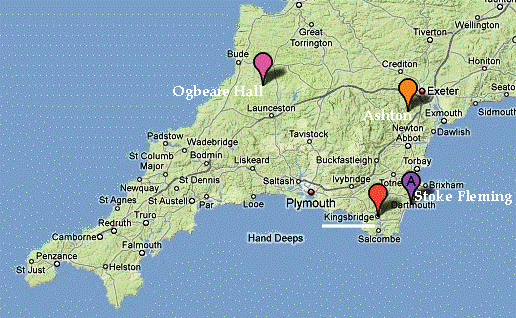james john mallandaine + honora frost
James was born on 3 November 1848 in Quevert, France, the son of John West Mallandaine and Cecilia Hawkes. James’ father died when he was only 11 years old and following his death, the family returned to England and initially settled in Folkestone, Kent.

Kings Royal Rifle Corp
Soon after their return, James was sent to boarding school in Slough, Berkshire and appears there as a scholar in the 1861 Census. In 1864, his mother submitted an application to the Queen’s Indian Cadetship, a program set up for the sons of ‘persons who have served in India in the military or civil service of Her Majesty or the East India Company’ who lacked the funds necessary to purchase a commission. James’ application was successful and he was admitted to the Royal Military College at Sandhurst on 1 February 1865.
His Sandhurst records list his height as 5’5 ½” when he entered the college aged seventeen. He completed his training in December 1865 and was commissioned as an Ensign into the 106th Regiment of Foot in the Bombay Light Infantry on 29 May 1866. He was promoted to the rank of Lieutenant in the 106th Regiment in September 1868. When the 106th Regiment was recalled from duties in India in 1871, James was transferred to the 60th Regiment of Foot in the King’s Royal Rifle Corps and was later promoted to Captain in March 1877.
While still in the army, James married Honora Frost at St Bridget with St Martin in Chester on 17 August 1881. Honora was born on 23 June 1858 in Chester, the daughter of Robert Frost and his wife Jane Frost. Robert’s father was a Master Miller and built up one of Chester’s most successful flour mills, F.A. Frost & Sons. Honora grew up in a very wealthy home and enjoyed the privileges that her family’s status provided including attending a Ladies Finishing School and summers at the family’s country house in Northern Wales.
The Cheshire Observer carried a story on the wedding on 21 August 1881 and noted that ‘shortly before the hour fixed for the ceremony the church was thronged with persons desirous of witnessing the marriage.’ Major H.C. Reynolds of the Intelligence Service acted as groomsman and Honora’s sisters, Constance and Frances, acted as bridesmaids. Of the guests listed at the service only one member of John’s family appears as a Miss Mallandaine, presumably one of his sisters. James and Honora honeymooned on the Continent and the article also includes a long list of wedding presents including a pair of silver dinner napkin rings and a carved Indian card case from Mrs. Mallandaine, a Russian leather satchel from Miss M. Mallandaine (possibly Mary Georgina), a diamond ring from Captain Mallandaine and a table cloth from Mrs. Blackett (sister Helen). The Observer also notes that the couple were married on the same day that Honora’s parents, Robert and Jane Frost, were married 28 years previously.
Less than a year after his marriage, James retired from the Army with 16 years service and his resignation was confirmed in the London Gazette:
The King’s Royal Rifle Corps, Captain James John Mallandaine retires from the Service, receiving a gratuity, with permission to retain his rank and to wear the prescribed uniform. Dated 6th May, 1882.
Following James’ retirement, the family moved south to Stoke Fleming, a small, seaside village on the south coast of Devon, where their first child John Medowes Hawkes was born on 3 June 1882. John’s name no doubt satisfied both sides of the family as Meddowes or Meadows was a Frost family name and Hawkes was his paternal grandmother’s family name.

Shortly after their son’s birth, James and Honora moved to Milford House in Horsell, Surrey. The house was owned by Honora’s father and in his will, dated 25 May 1895, he directed his executors to allow his daughter to have the use and occupation of the house and estate so long as she sees fit. Robert Frost left an estate valued at £188 000 which included a legacy of £120 000 to be divided between his three surviving daughters.
Their second child, Honora Frost, was born on 10 July 1883 at Milford House in Chertsey but by 1889, they had returned to Stoke Fleming where daughter Cecilia was born on 2 March. She was baptised at St Peter in Stoke Fleming four days later and the family’s address on the baptismal record was Blackpool Cottage.
James and Honora appear in the 1891 Census at the Falmouth Hotel in Falmouth, Cornwall where John was described as a Visitor and a Captain Late 60th Rifles and Honora as a Visitor living on her own means. They were travelling without their children – son John was attending boarding school near Lewisham in South London, Honora was staying with her aunt, Helen Blackett, and her family in Croydon and daughter Cecilia was staying with her grandfather Robert Frost and aunts in Torquay. Since the family was not at home when the census took place on 5 April, there is no record of where they actually lived but a notice in the fantastically named J.J. Trewmans Exeter Flying Post provides an interesting clue:
Wanted, Odd Man, to clean knives, boots, lamps, etc, and work in the garden — Captain Mallandaine, Ogbeare Hall, Holsworthy.
Ogbeare Hall is a large country estate located in North Tamerton near Holsworthy on the Devonshire — Cornwall border. The hall was originally built in the 15th century but was substantially rebuilt and restored in the 19th Century. The 1973 Autumn Edition of Old Cornwall published by The Federation of Old Cornwall Societies contains additional information on the hall:

Ogbeare Hall may be approached from the road at Hornacott Chapel. This way winds through woodland, and the first glimpse of the Hall, set a little below the ridge of the hill, makes it appear somewhat incongrous, as if a Victorian villa from a prosperous suburb had been placed in this somewhat remote Cornish district. The house was indeed rebuilt in Victorian times and subsequently modernised, but it still has at its heart, the Great Hall, with its granite fireplace, of stone mullioned windows and fine wooden roof, reminds one irresistibly of Cotehele or Trecarrol. Under the passage and accessible by stone stairs is a fine well. Outside, built into the walls or lying beside them are stones from the earlier Hall in which lived Leonard Lovis.
In 1881, the house was occupied by Joseph Holt, a Justice of the Peace, and his family and the 1889 Kelly’s Directory list the hall as the residence of Major Holt, a major landowner in the area. In the 1891 Census, the only residents of Ogbeare Hall were domestic servants — a gardener, caretake and general domestic. It is possible that James knew Major Holt through his military connections and rented the house from him in 1889-90.
By 1901, the family was back under one roof and living at 1 Manor House in Ashton, a small village in north east Devon, between Exeter and Dartmoor National Park. It is not known if they owned the house or simply rented it from a local landlord. Ashton Manor in Lower Ashton was the seat of the Chudleigh family and was substantially extended between 1889 and 1905. It is possible that James and his family stayed in one of these new additions or they may have stayed in a similarly named house in the village.
They returned to the south coast by 1907 and settled at Horswell House in the small market town of Kingsbridge, 10 miles south of Stoke Fleming. James died on 1 March 1911 at Roydon near Torquay but was buried in the church yard at Stoke Fleming. His obituary was printed in the London Times on 2 March 1911 and it included a request for Australian newspapers to reprint the notice — most likely for the benefit of his son John. In his will, John’s last address is listed as Ogbeare Hall and he left his £100 estate to his wife.
The 1911 Census of England and Wales was taken one month after James’ death and Honora was recorded as a Boarder at the Hotel Metropole in Minehead, Somerset along with her sister, Frances. Her daughters were listed as visitors in the household of Blyth Bickford Coham Fleming at his 22 room country house in Highhampton, North Devon.
One year later, Honora travelled to Australia with her two daughters to visit her son John and they arrived in Fremantle, West Australia on 14 May 1912 on board the Orvieto. The oral family history speaks of a difficult relationship between John Medowes and his father despite the fact that John followed in his father’s footsteps and joined the King’s Royal Rifle Corp. John was promoted to Second Lieutenant but resigned his commission in 1905 and emigrated to Australia. It could be that his difficult relationship with his father affected the whole family and it wasn’t until his father died that his mother and sisters felt able to visit him in Australia.

Honora died at Oldecourt in Torquay on 28 April 1917. Her obituary appeared in the London Times on 2 May 1917 and a more detailed story was printed in The Western Times on 28 December 1917. The second article confirms that Honora left an estate valued at £10 500 with the bulk of the estate passing to her three children and additional details on her burial:
Being afraid she might be buried alive she directed her medical man to sever her radial artery, and she is to be buried with her husband at Stoke Fleming, and her wedding ring, gold mizpah ring and a gold locket containing her husband’s hair, and a silver Indian locket with her son’s photo, shall be buried with her.
Her daughter Honora never married and lived with her family in Devon for most of her adult life. She maintained a close relationship with her brother John even after he emigrated to Australia and visited him twice, in 1912 and a second time alone in 1924. Honora died at Mount Stuart Nursing Home, Torquay on 15 June 1933 and left an estate valued at £14 000 with numerous legacies of jewellery, silver, glassware, furniture, and investment shares to her friends and god-daughters. She bequeathed the portait of her grandfather, John West Mallandaine, and silver salver with the coat of arms to her cousin, Henry Lucien Mallandaine. She left the remaining silver and some jewellery, including a diamond pendant and a topaz and pearl brooch, to her sister Cecilia and niece Elizabeth as well as an income trust. Her brother, John, was bequeathed £500 preference stock in the United Dairies Co. Ltd. and her niece, Sidney Blackett, received a cash legacy of £200.
Cecilia later married Hans Itel, possibly in Switzerland, and they had one daughter, Elisabeth Editha, on 5 May 1924 but the marriage ended in divorce several years later. By 1929, Cecilia had reverted to her maiden name and was living with her young daughter at 38 Reichensteinerstrasse in Basel before returning to England the following year and applying to reinstate her British citizenship and obtain the same for her daughter. Her application was successful and she returned to Devon and rented rooms at 10 Belmont Road in Torquay and later at 2 Marnham Road. In 1939, Cecilia and Elisabeth were living on Molehill Road in Chestfield near Whitstable in Kent. Her daughter Elisabeth married Ernest Martin on 24 April 1943 at the Croydon Registry Office but in the marriage notice, her surname was listed as Mallandaine rather than Itel so it is possible it was changed by deed poll.
Cecilia died in Sittingbourne, Kent in the fall of 1967 with her death registered under the name Itel. Her daughter, Elisabeth, died in Devon in 2005 just months after her husband. Ernest’s obituary appeared in The Independent newspaper on 5 May 2005 under the title ‘Radical champion of the rural poor’ and in The Guardian on 11 May under the title ‘Sensitive chronicler of the changing English countryside’ with both papers making reference to his marriage and confirming that they had no children.